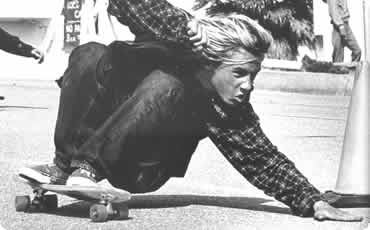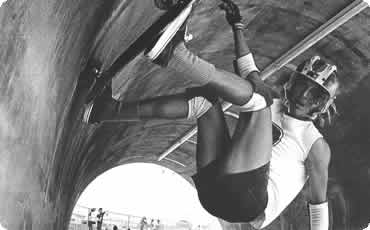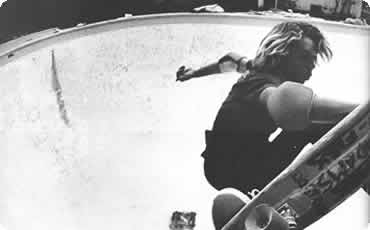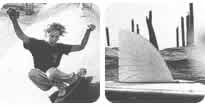| DOGTOWN
AND Z-BOYS
em Film review
Dogtown And Z-Boys is
a feature length documentary on the Sony Classics label. Narrated
by Sean Penn this film is mostly a cinematic version of the work
by writer and photographer, CR Stecyk on the ‘Dogtown’
area of LA and Zephyr team skateboarders.
Although at first appearing
to be a documentary about the origins of modern skateboarding culture
and style, there are really two films at work here. The first, as
mentioned, is a skateboarding documentary, not only about how skateboarding
really started, but about this rundown area of LA called ‘Dogtown’.
This incorporated the
area around Venice Beach and we are shown that it was once a thriving,
family area full of funfair rides and amusement parks. But things
slipped in the 60s and the place became nothing but a graveyard
to the many rides and attractions that once brought so many to visit
the area. The images that are shown of this degradation are haunting
to say the least, looking like the last place anyone would want
to visit for a fun family day out.

Despite being a rundown
wasteland, the surfing culture there still thrived, although it
was nothing like it is today, and surfers back then were seen as
drop-outs. But it’s here that we see the origin of the Z-Boys,
with the introduction of a small shop stared by a couple of local
surfers, including Jeff Ho, who designed and built their own surfboards
to stand out against the manufactured boards of the time.
You can see a real
gang culture starting to emerge at this point, not only through
the choice of surfboard decorations in Ho’s designs –
being influenced by the gang graffiti around the Dogtown area –
but also in the striking footage of the surfers as they weave in
and out of an old broken down pier in one particular rundown area
of the beach – its edge of the seat stuff as you know (and
are told through the interspersed interviews) one wrong move or
slip would have resulted in serious injury if not death.
| "Surfing
was all they wanted to do each and every day, it was their passion,
which is why they took to skateboarding so easily." |
But this area was ‘kept
local’ by the kids that surfed there, with graffiti warning
visiting surfers away, and tales of throwing lumps of concrete down
on those foolish enough to intrude on their ‘turf’.
However, despite the gang culture, they were excellent surfers nonetheless,
and this inspired that small surfing shop to form the Zephyr surfing
team.
From here the film
starts to focus on the skateboarding element, which is really what
this film is about. Skateboarding was a natural extension of surfing,
and it shows as members of the Zephyr surfing team take to skateboarding
for when the tide was out with relative ease, but trying to emulate
their surfing heroes on land instead of how skateboarding is seen
today. Surfing was all they wanted to do each and every day, it
was their passion, which is why they took to skateboarding so easily.
Through their unorthodox
style and attitude, the newly formed Zephyr skateboarding team really
started to stand out against other skateboarders of the time. No-one
else was crouching, or touching the ground or trying to ‘surf
on land’ as these kids were, and they did it with such style
that people began to really notice what was happening.
It could be difficult
to remember watching this movie that skateboarding was still a brand
new thing at the time, but the interviews with the original Z-Boys
how there are now only go to reiterate certain points at the right
time.
It might be difficult
for some younger viewers or those not familiar with the origins
of skateboarding to understand why the interviewees get so excited
when they come to talking about skating around dried-out pools and
going up the walls. But its something to remember that nothing had
been done like that before and skateboarding up until that point
had mainly just been done on the flat, performing handstands and
generally keeping balance.

But the passion and
sincerity in the voices of the original Z-Boys makes in easier to
understand just what an exciting time this was, and this is where
the film works well and where we see the flip side to the film emerge.
Because this isn’t just a documentary about skateboarding,
it’s also about passion, youth, rebellion, freedom and truly
living for what you believe in. They weren’t great skaters
because they practiced everyday, or had the best boards; they were
great skaters because it was part of their soul and they were passionate
about surfing and skateboarding.
This is apparent with
the story of the Z-Boys’ first skateboard competition where
they weren’t going along to win or compete, but just to skate.
And it’s a real ‘movie moment’ when they turn
up wondering just what the hell they were meant to do on a flat
exhibition area.
You know they’re
not only going to show up all the other skateboarders because their
skating comes from passion and natural style, and also emulating
surfing as opposed to the handstands and balancing acts from the
early 60s the other were still pulling off. But they were also going
to shock everyone with their long hair and ‘gang’ appearance
(the ‘uniform’ of the Zephyr skate team being the navy
t-shirt, Levi’s and navy Vans).
Dogtown And Z-Boys
is a fantastic documentary and should appeal to non-skateboarders
too, although some may have trouble understanding why the interviewees
speak with so much excitement in their voices as they remember the
times explored in the film.
But some younger skaters,
expecting to see a skateboarding film, may be disappointed. There
are no ollies, kick-flips or grinds here, this was how things started,
and it’s important to realise just how far skating has come.
But they did it with such style that it’s not boring to watch
by any means.
| "
It’s a real ‘movie
moment’ when they turn up wondering just what the hell
they were meant to do on a flat exhibition area. " |
At just over 90 minutes
it’s the perfect length; the interviews with the original
skaters and those that they influenced such as Jeff Ament, Tony
Hawk and Henry Rollins are well paced and really hold the piece
together. There are no real flaws in the film but the only minor
gripes I had though were that some of the footage of the kids skating
around the flat banks of the LA school grounds got a little repetitive
after a while, but there are some great 70s tracks playing throughout,
so it’s not like it gets boring.

Also, there’s
quite a serious moment where the Z-Boys start talking about how
great things could have been for one of the team, Jay Adams, and
the film takes quite a sombre, sincere mood. You’re left wondering
just what’s wrong with him or what happened to him, and you
can feel yourself getting a little upset but have no idea why, especially
as Jay is one of the interviewees.
It’s not until
the very end of the movie that it’s revealed that he’s
currently in prison and suddenly everything becomes clear –
but maybe this should have been mentioned earlier to fully understand
why all the others are so down about him.
It’s defiantly
one to catch at your local art house cinema (I doubt it’ll
be on anywhere else), and if not then wait for the video release.
Failing that I’m sure it’ll be on Channel 4 one day.
It’s definitely a film for any skateboarding fan, those into
counter-culture or even fans of 70s retro.
9/10
david
twomey
Got something to add or comment on?
Click here to discuss it in the eyemachine reviews forum.
|













